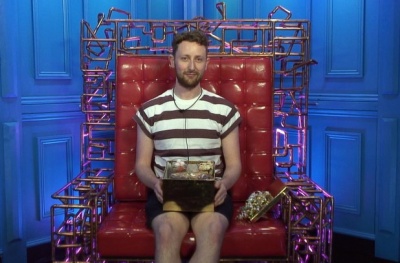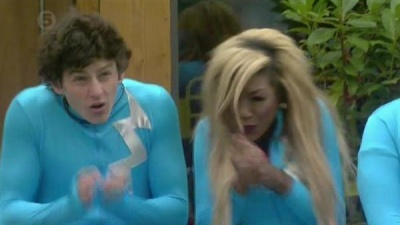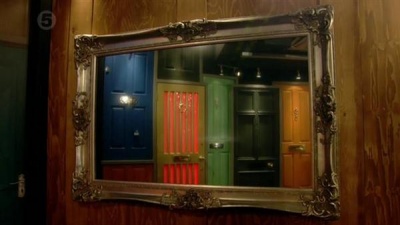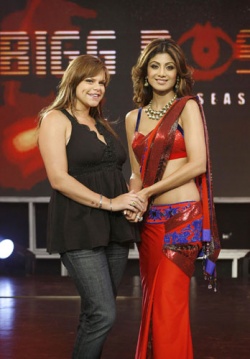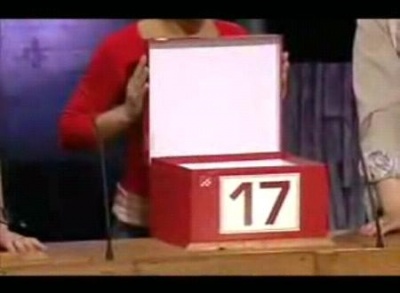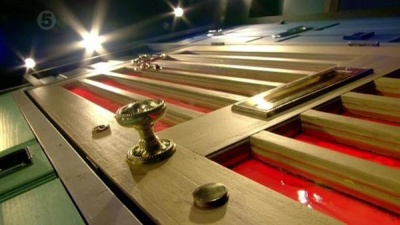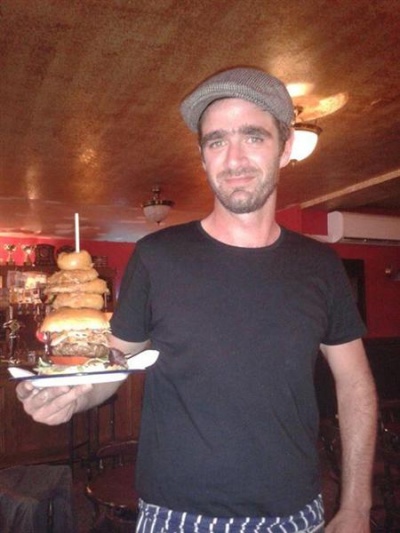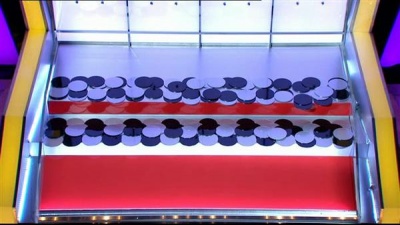Weaver's Week 2013-08-25
Last week | Weaver's Week Index | Next week
Not the greatest candidate for the government's mind-control programme.
Big Brother
Initial An Endemol Company for Channel 5, from 14 July 2000
Our annual wrap-up of the Big Brother television programme and matters arising is, this year, mostly matters arising. Our theory remains that Big Brother is an experiment upon society, albeit one run without scientific controls or any attempt to prove a particular theory. Amongst other results, we can draw tentative conclusions about the power of celebrity at given points in time, and reflect on how far the public will accept an omnipotent surveillance society.
But we need to begin with the television programme. This year's series began life as "Big Brother Secrets and Lies", promising deception layered on untruth formed on a foundation of falsehood and plumped up by a pile of piffle and kaphooey. This proved to be an inaccurate summary of the series. One of the original lab rats was "the viewer's puppet", told what to say in the privacy of the diary room, and told to do what the viewers told him to do. With a lack of subtlety that is Channel 5's hallmark, he was over-used, burned out, and removed from the cage in barely a week.
Had the producers – The Party hiding behind Big Brother's voice – wanted to seriously mess with the other lab rats, had the producers wanted to do something socially interesting, they would have given him something to do most days, but not every day, and stretched out his credibility to a month. But no, Michael was the most obvious puppet since The Hare, and the "Secrets and Lies" subtitle was quietly dropped a few days after he left. It was good to see him return for the new "Celebrity Big Brother" series.
There was a new rule for evictions: after nominations, at least three people would be up for the public vote, and voting was to evict – rather than to save, as had been standard in Brian Dowling's reign. The usual sort of nominations (two oaths uttered in private) remained unusual, with oaths in public, oaths by selected people, oaths with certain people immune, and oaths by "friends and family". It's curious how this external nomination process always produces the result of most immediate use to the producers.
Other hallmarks of the Channel 5 series were present and correct. Tasks weren't fully thought through, and were often presented in such a way that the viewers felt they could be rigged, and always for their enemy (or against their friend). Or, using less emotive language, that the rules weren't sufficiently clear to work out the winner until they were named. This column doesn't object to difficult questions and high concepts (we have a stack of ideas the height of Nelson's Column), but we don't like unfairness, and we don't like the appearance of unfairness.
For instance, in the final week, nominees were asked to name the amount of money they would want in order to leave the contest right now. Expectation, led on by hints and suggestions on Bit on the Side, was that the lowest bid would be accepted, the lab rat would get their amount of dosh they suggested from the winners' prize fund, and be removed at once. The only trouble is that none of the lab rats wanted to leave – the lowest bid was £88,000. That would have left just £12,000 in the prize pot, and would have removed the year's pantomime villain so voting revenue would have plunged. Only after the bids were in was the result announced – the lowest bidder got a pass to the final, and the right to put someone else up in their stead.
In the event, the winner was the lab rat who had done nothing to offend the public. Doing this kept him in the contest, and (for reasons we cannot fathom), rewarded him with the top prize.
This column doesn't just sit at home and watch game shows, of course. We get out and enjoy culture. Earlier this summer, we caught a performance by punk band Barb Wire Dolls. Like most bands, their lead singer banters with the audience, and spent some of the show railing against the surveillance equipment. "These cameras, they get everywhere, it's a surveillance society. They are watching your every move," was the gist of Isis Queen's argument. And then, rather than asking the audience for their insights, it was straight into another guitar-and-shouty tune.
During the course of the summer, various claims were made about the extent to which GCHQ, the NSA, and other governmental agencies have been regularly intercepting mobile phone and internet data. At one point, the claim by these spooks was "oh, it's just metadata, nothing to worry about." Metadata, as in which number called which number and when. As in, this phone number in Azerbaijan called that number which happens to be the Eurovision voting number for Armenia, and during the active voting window.
It would be terribly simple for the Azeri government to demand subscriber details for these phone numbers, and to send round some out-of-work oil riggers to say "Mmm, lovely house you've got here. Shame if anything happened to it next Eurovision season." We know it would be simple, because that's what the Azeris did, using nothing more than metadata.
There are claims that there are more cameras around New New Scotland Yard than in the whole of Vladivostok, there are claims that the government tries to know everything about everyone, there are claims that actually they leave that sort of thing to The Facebook and Google (who are actually good at this sort of thing) and just send some out-of-work oil riggers to ask for the information they want. And, if all else fails, they detain people for hours at Heathrow airport on dubious pretexts.
The public is meant to believe that GCHQ operates like the Big Brother research team: watching everything, recording everything, accumulating more data in 10 minutes than there is in the British Library, and sifting through that to draw an impartial and infallible retrospective. So that when Winston Smith is hauled before Justice Judge, she can say "Let's look at your best bits" before sentencing him to Room 101, where he'll be at the tender mercies of Frank the Skinner.
That's the theory. We've seen that the Big Brother programme falls far short of this ideal. Not everything is watched. Not everything is recorded. The footage is chopped and edited and spliced so as to make good television. The Party pursues the lines it's interested in, and ignores the rest. The Party remembers the incidents that help its narrative, and forgets the rest.
Has the Big Brother television programme helped to normalise mass surveillance, that everything everyone does is recorded, can be played back out of context, and a retrospective judgement formed? Well, maybe. We're not sure, and we don't have the insight to definitively answer in any particular direction. Some argue that, with about two million viewers to the programme, it may be more likely that Big Brother is watching you than vice versa.
All we can say for certain is that covert monitoring on the internet is now not a secret. And that Barb Wire Dolls were upstaged by their support acts.
For the first time in some years, no participant voluntarily left the Big Brother laboratory this year, whether through boredom or the provision of a large bribe. There was an exclusion: violent scenes between two of the lab rats allowed The Party to step in and remove one of the rodents. We understand that the authorities are considering a prosecution, and we're severely constrained from discussing matters that might come before the courts.
"Big Brother has removed this lab rat," came the announcement. "Nonsense! Rubbish!" the cries from the sofa, believing it to be yet another half-hearted attempt at a "ground-breaking" twist that broke less ground than a spade in a muddy field. Let this serve as a lesson to The Party: when you tell lies and fibs and talk nonsense for years, it's inevitable that your credibility will diminish. Even when they talk with the best of intentions, even when The Party believes it is talking honestly, the lab rats will see it as spin and bluster and will not believe a word of it.
Spin-off show Little Brother asked Rylan Clark to discuss this with the night's panel. It proved a successful demonstration. It very successfully exposed Clark's limitations, the things he could not do. Such as, hold a live phone-in about the removal, particularly when the lab rat concerned had not given his version of events. "There are two sides to this story," chuntered the host, doing a very passable impression of a rabbit transfixed by these large and increasingly bright lights. Never mind, he can always join the George Lamb fan club. Someone has to.
The exit interview fell to Emma Willis, and this might have been one of the best exit interviews of all. No crowd, just the host and the participant, allowing him to show his contrition, pressing him hard without ever passing further judgement. It's a shame that the rest of the exit interviews were in front of the crowd, and covered oh-so-predictable territory. Like the rest of the backup coverage – on television and online – The Party peddled its particular lines, with the usual aim of producing strong impressions from weak characters.
And The Party had the unusual aim of presenting this lab rat as some sort of hero, one to feature in The Party's official organs (The Daily Star and OK magazine, both under the same ownership as Channel 5). Their chosen tactic was to vilify the other lab rat involved, implying that she had been the aggressor. In the real world, it was a summer when seeming to throttle women became seriously uncool; just ask Charles Saatchi. In the Big Brother bubble, not so.
As ever, the Speak Your Branes places were full of agitated young minds complaining that it was all a fix. Many of them said that they would complain to Big Brother's Big Brother, the government-run Office of Communications. Ofcom, as it likes to call itself from its luxury pad on the South Bank.
Viewers who sent their moans to OFCOM were sending many signals. They told us how they disagreed with what The Party was doing. These viewers told us in the subtext they believed Big Brother was wrong, and that a higher power could correct it. It's a strange performance ritual, the complaint to OFCOM. It harks back to the 2007 Series of Blessed Memory, when Endemol's failures attracted such a torrent of bad publicity that some complaints had to be upheld. Ever since, the count of complaints considered by OFCOM has increased sixfold, causing OFCOM additional work to consider these objections.
But there's more to the complaints than that. In the sub-subtext, viewers tell us that they believe OFCOM will be the higher power to show The Party the error of their ways. And in this, viewers are almost always disappointed. OFCOM has a very narrow definition of what can go wrong on television. Offensive behaviour needs to be set in context and challenged, and that's where Jade-and-Shilpa failed. Not that Jade used hateful terms, not even that they were broadcast, but that Jade wasn't challenged on the programme. OFCOM also doesn't like bad language, and it insists that voting has to be fair and squeaky clean.
In this context, we note that paid voting via The Facebook wasn't available at all this year. Introduced in the 2011 series, paid votes were suddenly abolished part-way through the 2012 run, because of concerns that they might not be accurate. We can only assume that the problems haven't been resolved. We also note that OFCOM's pilot of voting via The Facebook and other internet applications has been extended yet again. The pilot originally ran for a year to August 2012, and was then extended to August 2013. When it finishes at the end of 2014, the "pilot" will have run for seven series of Celebrity Big Brother. It's clear that OFCOM wants to regulate internet voting, and wants to be seen to regulate internet voting. It's clear that the broadcasters and programme-makers don't want to use it at this time.
This brings us to the heart of the complaint performance: viewers want to believe that OFCOM is a competent and capable regulator. We mentioned earlier that OFCOM really doesn't like bad language. Not only does it object to the f-word before the 9pm watershed, but it has started objecting to the f-word immediately after 9pm. We've tried to find the research that supports OFCOM's new rule, and we've drawn a blank. In the voting pilot we mentioned above, OFCOM is soliciting opinions from broadcasters, but not from viewers. There's plenty in the OFCOM code to cover unfairness against political parties, but television companies breaking their word – for instance, not providing aftercare to their lab rats – is perfectly acceptable.
There's clearly a gap between what the public wants from its regulator, and what the current lot are prepared to do. To paraphrase, the general public would like OFCOM to enforce a rule along the lines of "Be excellent to each other", with broadcasters and producers and viewers all respecting each other. We get the impression the regulator would love the general public to butt out and leave broadcasting to the "experts". And ignore that the tide of history has been swimming against that "government knows best" assumption for many decades.
OFCOM prefers to enforce a narrower rule. Or, in some cases, to not even enforce the rules it has published. This blog wrote to OFCOM in June, about a change on our local radio dial, where a youth-focussed rock station had been replaced by a rock station. We vigorously disputed OFCOM's assertion that this was a trivial change; it amounted to format creep, and if we'd wanted an all-ages rock station we could have had one ten years ago. Over two months later, we're still waiting for a response from OFCOM.
Those who participate in the OFCOM dance expect it to support their position, and (ultimately) believe that it is a worthwhile organisation. This column does not share their optimism.
- "Regardless of how you do on the show, the people who love you still will, the people who don't won't, and world peace will not be achieved." – Alex Trebek, attributed.
So, at the end of the series, it's back to real life. For some, modelling; for some, office work; for some, flipping burgers on a grate. Speaking of which, we hear that Nathan Dunn (a lab rat from the 2010 series) is making flippin' great burgers for the people of That 'London'. Mr. Dunn is the head chef at the Three Compasses pub in Dalston, where his varied menu includes burgers made from pulled pork cured in the Dr. Pepper soft drink.
This Week And Next
The latest University Challenge match pitched SOAS – the School of Oriental and African Studies, part of London Uni – against Southampton. There was a close-up of Southampton's mas-cat, for reasons that weren't made terribly clear; one woman on the panels, which also tells us something. The first ten questions were all answered correctly, and Thumper wasn't able to get in his snark about the statue of Alan Turing in Manchester, because Southampton got the question right.
Once, twice, thrice, Southampton took the lead. Once, twice, thrice, SOAS drew level. On the third time, SOAS took the lead: only by five, but these things can grow. "Your bonuses are on atomic theory." These things won't grow. But these things do grow, thanks to SOAS buzzing in strongly. Not much strength on the bonuses, but when they're being asked to SOAS, Southampton can't score. And Southampton didn't score: SOAS kept them off the sheet, and did actually improve on their bonus rate to a much more healthy two-out-of-three. A brief comeback in the closing moments meant Southampton poke their nose onto the repêchage board, but SOAS are the clear winners, 230-155.
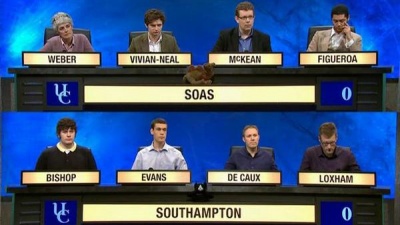 SOAS: Maeve Weber, Luke Vivian-Neal, Peter McKean, James Figueroa.
SOAS: Maeve Weber, Luke Vivian-Neal, Peter McKean, James Figueroa.
Southampton: David Bishop, Richard Evans, Bob De Caux, Matt Loxham.
Over at The X Factor, we hear that Gary Barlobe will be leaving the panel after the new series, in order to spend more time in songwriting classes. Suggestions that he'll be replaced by a large stuffed elephant have been rebutted by a large stuffed elephant, who says that she's going to judge Strictly Come Dancing or nothing. Elsewhere, One Direction have become the first X Fac alumni to have their own feature film: better plot than Batman, acting almost as realistic as Cars, and with a less predictable dance routine than Grease.
In this week's Mastermind, Darren Martin (Feature Films of Peter Sellers) scored regularly, and answered or passed quickly. 10 (3). His general knowledge round begins strongly, but he forgets about The Day Today, and falls into something of a pass spiral. The final score is 21 (8), entirely respectable.
Chris Kilbride (Life and Music of Paul Robeson) worked well with the mid-20th-century gospel singer, though with slow answers. 10 (1) builds: Mr. Kilbride answers slowly, but he answers surely, and before we know it he's pushed into the lead and – after a brief stall – continues the climb to finish on 26 (1).
Pat Ready (Orchids) was on course for a perfect round until the last few questions, and made 11 (2). Her general knowledge round starts strongly, but then falls into the Path Pitted With Passes, closing on 19 (9).
Barry Nolan (Open golf championship 1960-2012) enjoyed the rub of some helpful questions, and still found time to shoot the host a look saying, "have you quite finished your over-long question?". 12 (1) gave a narrow lead, and the contender started strongly on the trek to the win. It's not as long as the trek up Signal Hill; however close the top looked earlier, it never quite gets into reach. "I don't have time to start the next question" says the host before giving the score. 26 (3).
So Chris Kilbride has won by a whisker. Watch out for him, he looks like a dark horse in the next round. There's a chance that Barry might return as a high-scoring loser, and we wouldn't baulk at that.
We caught an advert claiming that Jeff Stelling was the king of the catchphrase. This is rot: while he's the second-best Countdown host, he never solved the "no catchphrase" conundrum that had been running for three decades. Nick Hewer has contrived a little mantra all of his own: you be sure of it.
BARB ratings in the week to 11 August tell us how Celebrity Masterchef was the most-seen programme, 4.55m tuned in. 4.35m for Break the Safe, and 3.8m for Tipping Point Lucky Stars. Apparently, one of the television festivals said that ITV was the best channel on the dial: we reckon Tipping Point is the most typical ITV programme of them all. It's light-hearted, it's fun, it's frothy, and we've never looked back and thought "what did we get out of that hour?"
On with the ratings! 3.35m for Dragons' Den, 2.15m for 8 Out of 10 Cats Does Countdown, and 1.9m for a Big Brother eviction. Good to see Channel 4 beating Channel 5, just a shame it's not with an inventive programme. Only Connect finished with 1.08m viewers, putting it ahead of Come Dine with Me (1.06m) and Four Rooms (1m, the highest confirmed rating of the year). Other digital flyers were 720,000 for Hell's Kitchen on ITV2, and 410,000 on UK Living for Britain and Ireland's Next Top Model.
This week, Gok Wan takes on Deal or No Deal (C4, 8pm Sun). We've difficult episodes of Only Connect (BBC2, 7.30 weekdays, except Wales), Celebrity Juice (ITV2, 10pm Thursday), Fighting Talk (Radio 5, 11am Saturday), and apparently tonight's edition of QI (BBC2, 10pm) hasn't been seen before. There's a clip show explaining how Lindsey Russell won Blue Peter You Decide (CBBC, 5.30 Thursday), ahead of her proper introduction next week. ITV's autumn schedule begins on Saturday: Stepping Out (6.30) is Mr and Mrs meets Strictly Come Dancing. The X Factor (8pm) is a show you'll know about. Through the Keyhole (9.20) is back, and Keith Lemon is the new David Frost. Ooh heck.
To have Weaver's Week emailed to you on publication day, receive our exclusive TV roundup of the game shows in the week ahead, and chat to other ukgameshows.com readers, sign up to our Yahoo! Group.

